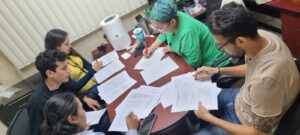
Fighting Antimicrobial Resistance: Dr Sherifat Balogun-Raji’s journey towards research impact in Nigeria with AuthorAID
In Sokoto, in Nigeria’s far northwest, Dr Sherifat Balogun-Raji, is tirelessly working to tackle a global health challenge with far-reaching implications for people across the globe. Dr Balogun-Raji focuses on the characterisation of genes resistant to antimicrobials in E. coli and Salmonella from poultry – and in a world where zoonotic disease are an ever greater risk, her work is important not just to Sokoto’s poultry industry, but to communities farming poultry across the world, human populations, and ultimately to all of us. AuthorAID, Dr Balogun-Raji explains, has helped her to access the resources and advice she needed to advance her research.
Antimicrobial resistance is an urgent global health issue that threatens our ability to effectively combat infectious diseases. Dr Balogun-Raji’s research centres on Salmonella pullorum, a bacterium responsible for a range of poultry diseases. Her objective is to understand the molecular mechanisms underpinning its antimicrobial resistance. Poultry farming is a major source of income to communities in Sokoto, as it is in many low- and middle-income countries. Contamination of these products with antibiotic-resistant bacteria like Salmonella Pullorum poses a severe threat to livelihoods, food security and human health. Antimicrobial resistance in poultry can also result in the transfer of resistant genes to bacteria that infect humans, potentially leading to serious treatment challenges and life-threatening infections, especially in regions where access to medical care is limited.
Dr Balogun-Raji’s enthusiasm for her research is palpable. She shares, “First and foremost, my research, which delves into the molecular characterisation of antimicrobial genes in Salmonella pullorum and explores the antimicrobial effect of Mango kernel (Mangifera indica. L) on Salmonella carrying those resistance genes, is incredibly thrilling for me personally.” She explains that the potential discovery of a novel antimicrobial agent, of plant origin, that can combat resistance genes and offer a cure would be significant.
Despite her dedication and enthusiasm, Dr Balogun-Raji has encountered numerous challenges. A scarcity of resources, inadequate access to journal articles, research materials, and laboratory equipment have hindered her progress. She has often had to pay for journals, source reagents from abroad, and send samples internationally, making her research financially burdensome. Additionally, her laboratory is often under-equipped, lacking the necessary infrastructure and instruments required for molecular research. The shortage of trained personnel and expertise in molecular research in Northern Nigeria is a further obstacle, not only for Dr Balogun-Raji, but also for other aspiring researchers.
“For women and girls who aspire to enter my field, particularly African women and girls, I encourage them to embark on research in antimicrobial resistance because the world urgently requires their contributions. Africa possesses abundant intellectual capacity, as well as plants and herbs with immense therapeutic potential. It is our duty to play a part in swiftly halting the menace of antimicrobial resistance.” – Dr Sherifat Balogun-Raji
In spite of these formidable challenges, Dr Balogun-Raji’s determination has propelled her forward. AuthorAID has played a pivotal role in enabling her to overcome some of these obstacles – helping her to secure access a wealth of research materials, including journal articles and research resources that would have otherwise been prohibitively expensive to obtain. Being able to access them significantly they enhanced the quality and depth of her research. In addition, AuthorAID helped her to make connections with experienced mentors and fellow researchers in her field, which not only enriched her knowledge but also opened up avenues for collaboration and knowledge exchange.
Dr Balogun-Raji’s journey exemplifies the resilience and potential of researchers of many early career researchers who are striving to do important work in difficult conditions. With support from initiatives like AuthorAID, she can not only lift her own career to greater heights, but ultimately bring important new knowledge to bear on pressing global health and food security challenges.

 Previous Post
Previous Post Next Post
Next Post


